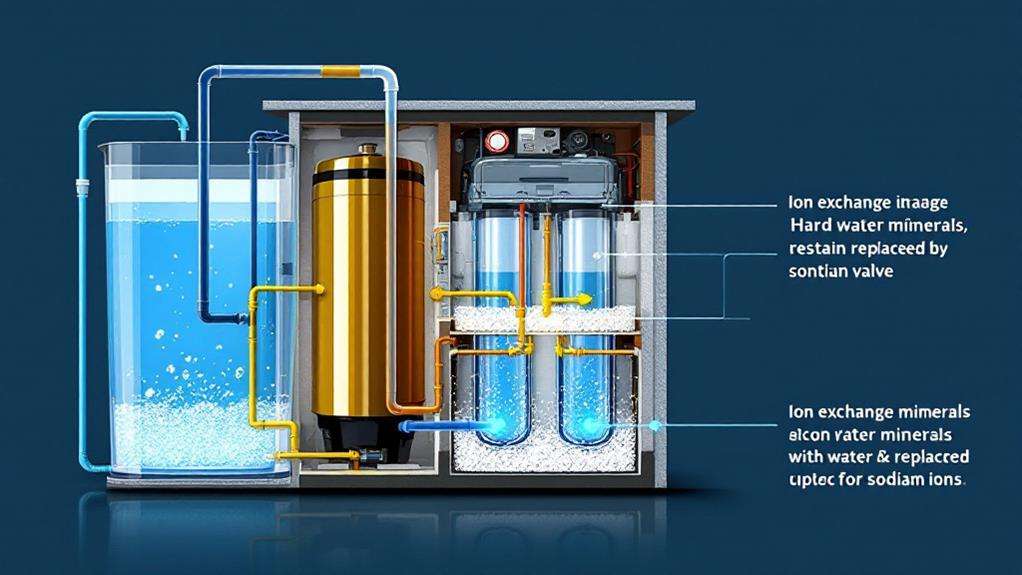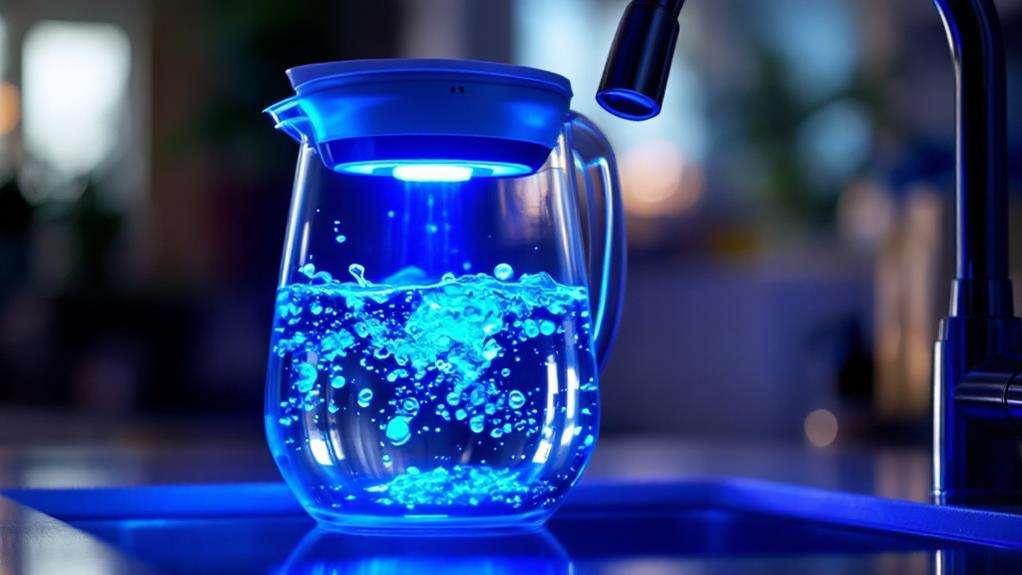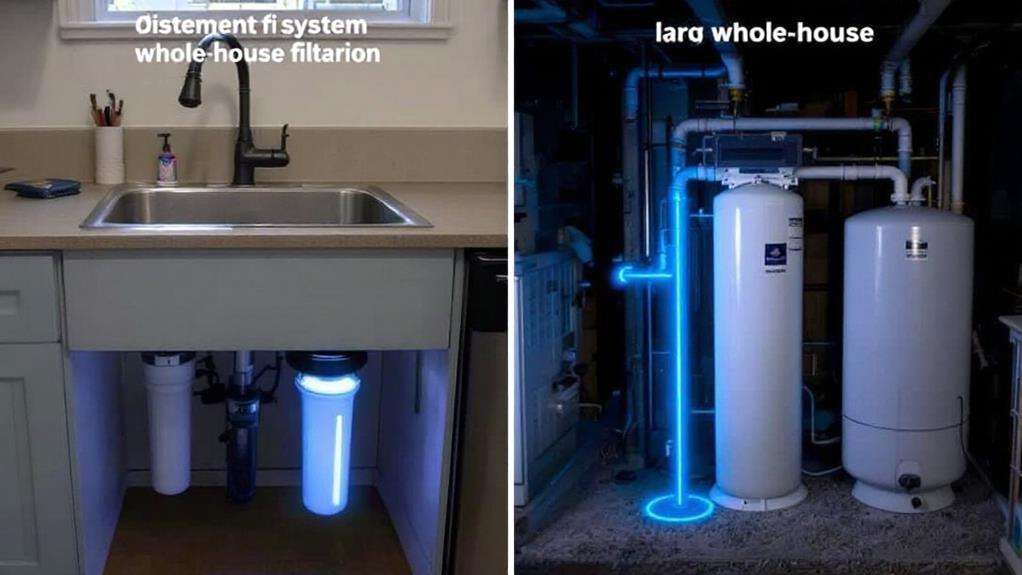A Guide to the Different Types of Home Water Treatment Options
You'll uncover a variety of home water treatment options to guarantee your family drinks clean, safe water. From activated carbon filters to reverse osmosis systems, each method targets specific contaminants. Water softeners tackle hard water issues, while UV disinfection eliminates harmful microorganisms. Distillation produces ultra-pure water, and you can choose between point-of-use or whole-house systems based on your needs. Consider factors like your water quality, budget, and maintenance requirements when selecting a system. Regular upkeep, including filter replacements, is important for ideal performance. By exploring these options, you'll be well-equipped to make an informed decision about your home's water treatment solution.
Understanding Water Quality
In light of the importance of clean water, understanding your home's water quality is indispensable. Water quality refers to the chemical, physical, and biological characteristics of water, including the presence of contaminants. To assess your water quality, you'll need to conduct water testing. This can be done through local water treatment facilities or by purchasing home testing kits.
Your specific water quality depends on various factors, including your location, water source, and local infrastructure. The Environmental Protection Agency (EPA) sets standards for safe drinking water, but it's critical to be aware that these standards don't cover all potential contaminants. When evaluating your water, consider factors such as water clarity, odor, and taste. However, remember that some harmful substances may not be detectable without proper testing.
To guarantee you're consuming safe water, it's imperative to identify any potential issues and address them accordingly. This may involve installing appropriate water treatment systems or filters. By taking proactive steps to understand and improve your water quality, you can help safeguard your health and ensure access to potable water in your home.
Filtration Systems
Filtration systems offer a practical solution for addressing water quality concerns in your home. These water treatment solutions come in various forms, each designed to target specific contaminants and improve your water's overall quality.
Activated carbon filters are popular in home water filtration systems due to their effectiveness in removing chlorine, volatile organic compounds (VOCs), and certain chemicals. They're often used in combination with other filters for inclusive treatment. Mechanical filters, such as sediment filters, capture suspended particles but require regular maintenance to guarantee optimal performance.
For more thorough purification, you might consider reverse osmosis systems. These use a semi-permeable membrane to remove up to 99% of waterborne contaminants, including dissolved salts and minerals. If you're concerned about microorganisms, ultraviolet (UV) filtration systems can effectively deactivate bacteria, viruses, and other pathogens without using chemicals.
When choosing between whole house water filtration and point-of-use systems, consider your specific needs and water quality issues. Whole house systems treat all water entering your home, while point-of-use filters target specific taps or appliances. By understanding the strengths of different filtration methods, you can select the most suitable water treatment solution for your household.
Water Softeners

Addressing the issue of hard water, water softeners offer an effective solution for homeowners plagued by mineral-rich water supplies. These systems use ion exchange to remove calcium and magnesium, the primary culprits behind hard water. As water flows through the softener, these minerals are replaced with sodium or potassium ions, resulting in softer water.
You'll find that water softeners can dramatically extend the lifespan of your appliances and plumbing by preventing scale buildup. This can lead to improved efficiency and reduced maintenance costs over time. However, it is crucial to acknowledge that the softening process doesn't remove other contaminants like heavy metals, bacteria, or organic compounds.
To maintain their effectiveness, water softeners require periodic regeneration. This process uses a brine solution to recharge the ion exchange resin, ensuring continued performance. If you're on a sodium-restricted diet, consult your doctor before installing a water softener, as it adds sodium to your water. Remember that while water softeners effectively combat hard water issues, they're just one part of an all-encompassing water treatment strategy. Consider combining them with other filtration methods for optimal results.
Reverse Osmosis Systems
While water softeners tackle mineral-related issues, reverse osmosis (RO) systems offer a more thorough approach to water purification. These systems use a semipermeable membrane to remove up to 99% of dissolved solids, minerals, and contaminants from your water. RO systems typically provide superior water quality by eliminating a wide range of impurities, including lead, nitrates, arsenic, and fluoride.
You'll find RO systems particularly useful if you have well water or municipal water with high levels of dissolved minerals, salts, or other contaminants. However, it's important to contemplate the drawbacks. These systems waste a significant amount of water during the purification process, with typical wastewater rates ranging from 3 to 5 gallons for every 1 gallon of purified water.
Additionally, reverse osmosis membranes require periodic replacement, which can be an ongoing expense. Regular maintenance is indispensable to guarantee your RO system functions effectively. While the initial investment and maintenance costs may be higher than other water treatment options, the exceptional water quality provided by reverse osmosis systems makes them a popular choice for homeowners seeking inclusive water purification.
Ultraviolet Disinfection

Ultraviolet light technology offers a chemical-free approach to water disinfection. UV systems use powerful ultraviolet light to inactivate bacteria, viruses, and other microorganisms in your water supply. This method works by disrupting the DNA of harmful pathogens, rendering them unable to reproduce and cause illness.
One of the main advantages of UV disinfection is that it doesn't add any chemicals to your water or remove beneficial minerals. It's highly effective against a wide range of waterborne pathogens, including tough-to-eliminate organisms like Cryptosporidium and Giardia. You'll appreciate that UV treatment leaves no residual disinfectant in your water, making it a truly chemical-free water treatment option.
However, it is crucial to remember that UV systems require regular maintenance to guarantee sustained effectiveness. You'll need to replace the UV lamp periodically and keep the system clean. Additionally, the effectiveness of UV disinfection can be impacted by water quality factors such as turbidity. If your water is cloudy or contains particles, it may reduce the UV light's ability to penetrate and disinfect thoroughly. Consider pre-filtration if your water has high turbidity levels.
Distillation Methods
Boiling down to its essence, distillation is a time-tested method for purifying water. This water treatment process involves heating water to its boiling point, collecting the steam, and condensing it back into liquid form. Distillation systems can remove an impressive 99.9% of minerals, microorganisms, and most organic compounds from your drinking water.
When you're examining water filtration systems, distillation offers unique benefits. It's highly effective at producing pure water with very low total dissolved solids (TDS) content. However, this purity comes at a cost. Distillation is an energy-intensive process, which can lead to higher operating expenses compared to other water treatment methods like reverse osmosis or traditional filtration.
It's important to note that distillation isn't perfect. While it can substantially improve water quality, it doesn't remove volatile organic compounds (VOCs) that evaporate along with the water. Additionally, the resulting water may taste flat due to the removal of minerals. To address this, you might need to consider remineralization to enhance the taste of your treated drinking water. Despite these drawbacks, distillation remains a reliable option for those seeking thorough water purification.
Point-of-Use vs. Whole-House Systems

When choosing a water treatment system for your home, you'll likely encounter two main categories: point-of-use (POU) and whole-house or point-of-entry (POE) systems. POU systems treat water at specific taps or appliances, while POE systems treat all water entering your home.
POU options, like under-sink filters or faucet-mounted units, are typically smaller and less expensive than POE systems. They're designed to target specific contaminants, making them ideal for addressing localized water quality issues. On the other hand, POE systems, such as water softeners and UV systems, provide extensive whole house filtration, improving water quality for all uses throughout your home.
When deciding between POU and POE home water treatment systems, consider your specific needs. POU systems offer convenience for targeted treatment, while POE systems provide whole-home protection. Evaluate the scope of treatment required, installation requirements, ongoing maintenance, and costs. POE systems may involve more complex installation but offer broader protection. POU systems are easier to install but may require multiple units for full coverage. Ultimately, your choice will depend on your water quality concerns, budget, and desired level of protection.
Maintenance and Replacement Considerations
Regular maintenance is crucial for guaranteeing the effectiveness of your home water treatment system. To maintain optimal performance and prevent contaminant buildup, you'll need to replace filters regularly. Manufacturers typically recommend changing replacement filters every 6-12 months, or when the indicator light signals it's time for a change. This timeline can vary based on your water usage and quality.
Don't neglect filter replacements, as doing so can lead to diminished contaminant reduction, reduced water flow, and potential health risks. For water softeners and other treatment equipment, proper maintenance, such as backwashing or regeneration, can extend their lifespan and efficiency.
When selecting a home water treatment system, consider the ongoing costs of filter replacements and factor them into your budget. Regular maintenance not only ensures your system continues to function properly but also protects your investment in clean, safe water. By staying on top of these maintenance tasks, you'll keep your water treatment system running smoothly and effectively, providing you with high-quality water for years to come.
